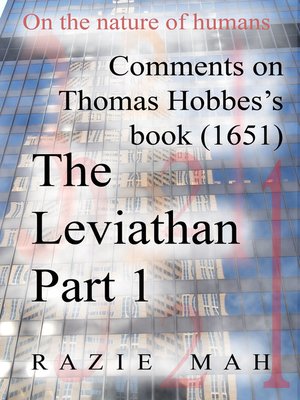Comments on Thomas Hobbes Book (1651) the Leviathan Part 1
ebook ∣ Comments on Thomas Hobbes Book (1651) the Leviathan Parts 1-4
By Razie Mah

Sign up to save your library
With an OverDrive account, you can save your favorite libraries for at-a-glance information about availability. Find out more about OverDrive accounts.
Find this title in Libby, the library reading app by OverDrive.



Search for a digital library with this title
Title found at these libraries:
| Library Name | Distance |
|---|---|
| Loading... |
Modernism belongs to the Age of Ideas. According to John Deely, two figures mark the turning point from the Latin Age to the Age of Ideas. They are Rene Descartes, pointing the way to the Age of Ideas, and John Poinsot, arriving at the triadic nature of the sign relation. The time is 1650 AD.
These comments examine a book published in 1651 AD, precisely at the turning identified by John Deely. In The Leviathan, Thomas Hobbes builds a model of the subject and the commonwealth based on natural civil laws.
Hobbes' description of the subject and the commonwealth intimate the modern concepts of the citizen and the civil state. For that reason, he was called a monster. He is the prophet of the modern totalitarian state.
These comments differ from modernist commentaries, which try to identify where Hobbes went wrong, his system of thought, and so on. Instead, they show that Hobbes' models of speech and power are relational structures. They are precisely the types of structures that John Poinsot elucidated in the waning days of the Latin Age. They are also the types of structures that Thomas Hobbes rejected in his human mechanical philosophy.
Part 1 is entitled, "On Man".
In my comments, I use the category-based nested form to show that the subject and commonwealth match the content and situation levels of the society tier. The society tier was introduced in the foundational work: How To Define the Word "Religion".







